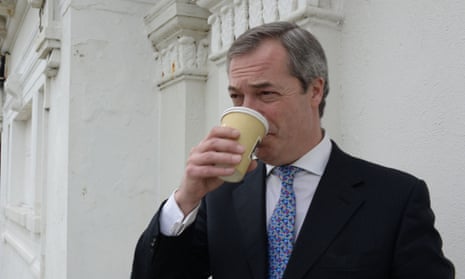Support for the Conservatives among younger voters born after 1980 dropped by a fifth last year, according to polling data provided to the Guardian by Ipsos Mori.
However, the principal beneficiary of the fall in Tory support has not been Labour – traditionally the most popular party with 18-34-year-olds –but Ukip, which has seen its own poll rating among younger voters more than double in the past year.
While the Conservatives’ support fell from 20.5% to 15.6%, Ukip has seen support among so-called Generation Y voters increase from 2.4% to 5.5%.
Labour also has seen its support tumble, according to Ipsos Mori, with its share going from 33.9% in 2013 to 26.2% last year.
Ukip still gains most of its strength from the “grey vote” – attracting 12.7% among all those born between 1945 and 1965, and is on 12.2% with those born before 1945– but the Ipsos Mori figures somewhat contradict the widely held assumption that Farage has no appeal for younger voters.
Significantly, Ukip is polling close to the Green party, among an age group where the party would expect to do far better. Support for the Greens, who are led by Natalie Bennett, has nearly doubled over the last year, from 3.7% to 6.9%.
Ukip is only clearly outpolled by the Greens among 18-24-year-olds, where YouGov polls have the Greens level-pegging with Cameron’s party at 22%.
Ukip’s support among Gen Y is also virtually on a par with the Liberal Democrats, who have stagnated on 6% for a while now.
On the eve of the 2010 general election, YouGov had Clegg’s party on 37% among those aged 18-34 – although since then the party has seen its standing collapse with younger voters following the decision to reverse a pre-election pledge on tuition fees.
Younger voters remain softer
Meanwhile, the proportion of younger voters who say they will not vote in May has increased to more than 12%, from just under 10% in 2013, which is unusual as the election is getting closer. Only 40% among Gen Y are certain to vote at the next election, compared with about seven in 10 of those born before 1965.
Looking at the Ipsos Mori findings across all age groups shows that it is Labour that has lost more voters than the Tories in 2014. Compared with 2013, support for Ed Miliband’s party has dropped by more than 15% across all age groups except among those aged above 69 (where the proportion backing Labour has remained virtually unchanged).
Labour does still lead the Conservatives amongst Generation X voters, ie those born between 1966 and 1979, as well as those aged between 18 and 34. But such is the age divide in Britain that David Cameron’s party is ahead in all the older age groups, i.e. those aged 49 or more.
Over the same 12 month period, the Tories gained support from all age groups except among those born after 1980. That reflects the headline voting trends – in Britain-wide polls the two main parties are now divided by only a couple of points. At the end of 2013, Miliband’s party held a more comfortable five-six point lead.
The Lib Dems have made no significant gains with any age group and remain stuck on 5.5%-6.5% across the electorate as a whole. From pensioners to 18-year-olds the foundations of Clegg’s party remain modest.
This is in stark contrast to Ukip and the Greens – both parties made gains over the past year across all age groups.
All generations distrust politicians – not just younger voters
The Ipsos Mori analysis finds that regardless of age almost no voters trust politicians to tell the truth.
Less than 20% of Generation Y trust a politician to be truthful. However, the distrust is even greater among baby boomers – among those born between 1945-65, just above one in 10 would trust a politician not to lie.
All this implies that the challenge of re-engaging disillusioned young voters with politics and the electoral process is a lot more complex than simply “winning back trust”.

Comments (…)
Sign in or create your Guardian account to join the discussion